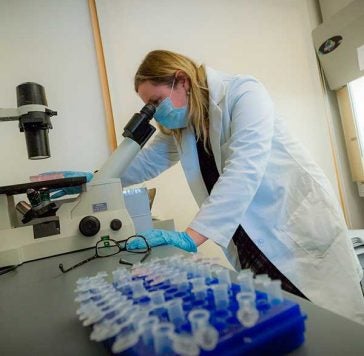
Dr. Angela Slitt and her team are in the final stages of a saliva-based QuantiCOVID-19 nucleic acid test. The test uses cooperative nucleic acid hybridization, which is a technology Dr. Slitt’s laboratory uses to quantify gene expression in human hepatocytes treated with various PFAS. The work was recently covered in the Providence Journal and Boston Globe. Dr. Slitt’s team has demonstrated that the test can detect Sars-CoV-2 with an estimated level of detection of 4000 copies/ml. In partnership with University of Rhode Island Athletics, the newly formed URI Ram Lab and Dr. Margi Teasdale, a Research Associate Professor in The College of Pharmacy, a large-scale clinical study was performed testing over 1500 paired saliva and nasal swab samples from URI athletes and symptomatic students.
The results of the clinical study indicated that the assay is highly sensitive and accurate for Sars-CoV-2 in human saliva. The test materials, equipment and collection materials are also relatively inexpensive, making testing more accessible to parts of the world that need access to high throughput testing. The team is also working with Thermo Fisher Scientific of Waltham, Massachusetts, to validate the test and provide the necessary supply chain for distribution. “With minimal scientific equipment, we can not only increase our capacity in the United States but also help to put accurate testing tools into the hands of people in developing countries in need of them,” says Slitt.


